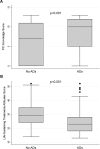Advance directives among community-dwelling stroke survivors
- PMID: 37847705
- PMCID: PMC10581473
- DOI: 10.1371/journal.pone.0292484
Advance directives among community-dwelling stroke survivors
Abstract
Objective: Advance directives (ADs) are integral to health care, allowing patients to specify surrogate decision-makers and treatment preferences in case of loss of capacity. The present study sought to identify determinants of ADs among stroke survivors.
Methods: In this cross-sectional study (Care Attitudes and Preferences in Stroke Survivors [CAPriSS]), community-dwelling stroke survivors were surveyed on ADs; validated scales were used to query palliative care knowledge and attitudes towards life-sustaining treatments. Logistic regression was used to determine variables associated with ADs.
Results: Among 562 community-dwelling stroke survivors who entered the survey after screening questions confirmed eligibility, 421 (74.9%) completed survey components with relevant variables of interest. The median age was 69 years (IQR 58-75 years); 53.7% were male; and 15.0% were Black. Two hundred and fifty-one (59.6%) respondents had ADs. Compared to stroke survivors without ADs, those with ADs were more likely to be older (median age 72 vs. 61 years; p<0.001), White (91.2% vs. 75.9%, p<0.001), and male (58.6% vs. 46.5%, p = 0.015), and reported higher education (p<0.001) and income (p = 0.011). Ninety-eight (23.3%) participants had "never heard of palliative care". Compared to participants without ADs, participants with ADs had higher Palliative Care Knowledge Scale (PaCKS) scores (median 10 [IQR 5-12] vs. 7 [IQR 0-11], p<0.001), and lower scores on the Attitudes Towards Life-Sustaining Treatments Scale (indicating a more negative attitude towards life-sustaining treatments; median 23 [IQR 18-28] vs. 29 [IQR 24-35], p<0.001). Multivariable logistic regression identified age (OR 1.62 per 10 year increase, 95% CI 1.30-2.02; p<0.001), prior advance care planning discussion with a physician (OR 1.73, 95% CI 1.04-2.86; p = 0.034), PaCKS scores (OR 1.06 per 1 point increase, 95% CI 1.01-1.12; p = 0.018), and Attitudes Towards Life-Sustaining Treatments Scale scores (OR 0.91 per 1 point increase, 95% CI 0.88-0.95; p<0.001) as variables independently associated with ADs.
Conclusions: Age, prior advance care planning discussion with a physician, palliative care knowledge, and attitudes towards life-sustaining treatments were independently associated with ADs.
Copyright: © 2023 Gupta et al. This is an open access article distributed under the terms of the Creative Commons Attribution License, which permits unrestricted use, distribution, and reproduction in any medium, provided the original author and source are credited.
Conflict of interest statement
The authors have declared that no competing interests exist.
Figures


References
Publication types
MeSH terms
Grants and funding
LinkOut - more resources
Full Text Sources
Medical

